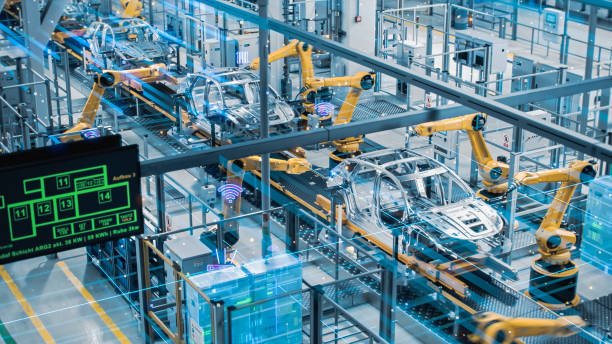Modular Production Systems: Redefining Flexibility in Manufacturing
The concept of modular production systems is revolutionizing manufacturing processes across industries, offering unprecedented flexibility and efficiency. This innovative approach to production design and implementation is reshaping how companies adapt to market demands, optimize resources, and maintain competitiveness in an ever-evolving industrial landscape.

Historical Context and Industry Developments
The roots of modular production can be traced back to the mid-20th century, with early concepts emerging in the automotive industry. However, it wasn’t until the late 1990s and early 2000s that modular production systems began to gain significant traction across various manufacturing sectors.
Traditional manufacturing setups often relied on fixed, inflexible production lines designed for long-term, high-volume production of specific products. This approach, while efficient for mass production, lacked the agility to adapt to rapidly changing market demands or product variations.
The advent of computer-integrated manufacturing (CIM) and flexible manufacturing systems (FMS) in the 1980s and 1990s laid the groundwork for more adaptable production processes. These developments paved the way for the modern concept of modular production systems, which takes flexibility and scalability to new heights.
Key Components of Modular Production Systems
Modular production systems are built on several core principles and components that enable their unique advantages:
-
Standardized Interfaces: Modular systems utilize standardized connections and interfaces between different production modules, allowing for easy integration and reconfiguration.
-
Plug-and-Play Functionality: Production modules can be quickly added, removed, or replaced without extensive downtime or retooling, facilitating rapid adaptation to changing production requirements.
-
Distributed Control Systems: Instead of centralized control, modular systems often employ distributed control architectures, enabling greater flexibility and fault tolerance.
-
Scalability: Modular designs allow for easy scaling of production capacity by adding or removing modules as needed, without requiring a complete overhaul of the entire system.
-
Interoperability: Modules from different manufacturers or with varying functions can work together seamlessly, provided they adhere to standardized interfaces and protocols.
Benefits and Impact on Manufacturing Operations
The implementation of modular production systems offers numerous advantages that can significantly impact a company’s operational efficiency and market responsiveness:
-
Increased Flexibility: Manufacturers can quickly adapt to changing product designs, volumes, or market demands by reconfiguring their production lines with minimal disruption.
-
Reduced Time-to-Market: The ability to rapidly set up or modify production lines allows companies to bring new products to market faster, gaining a competitive edge.
-
Cost Efficiency: Modular systems can lead to reduced capital expenditures by allowing for incremental investments in production capacity and easier reuse of equipment across different product lines.
-
Improved Maintenance and Uptime: Individual modules can be serviced or replaced without shutting down the entire production line, leading to higher overall equipment effectiveness (OEE).
-
Enhanced Product Customization: The flexibility of modular systems enables manufacturers to efficiently produce a wider range of product variants or customized products without significant retooling.
Challenges and Considerations
While modular production systems offer numerous benefits, their implementation is not without challenges:
-
Initial Investment: The upfront cost of implementing a modular system can be higher than traditional fixed production lines, although long-term benefits often outweigh this initial investment.
-
Standardization Efforts: Developing and adhering to industry-wide standards for modular interfaces and protocols can be complex and time-consuming.
-
Workforce Training: Employees need to be trained in working with modular systems, which may require different skill sets compared to traditional manufacturing environments.
-
System Integration: Ensuring seamless integration between different modules and existing IT systems can be technically challenging and may require specialized expertise.
-
Quality Control: Maintaining consistent quality across a highly flexible production system requires robust quality management processes and advanced monitoring technologies.
Future Trends and Innovations
As modular production systems continue to evolve, several emerging trends and innovations are shaping their future:
-
AI-Driven Optimization: Artificial intelligence and machine learning algorithms are being integrated into modular systems to optimize production flow, predict maintenance needs, and enhance overall efficiency.
-
Advanced Robotics: The incorporation of collaborative robots (cobots) and autonomous mobile robots (AMRs) is enhancing the flexibility and capabilities of modular production systems.
-
Digital Twins: Creating digital replicas of modular production systems allows for virtual testing and optimization of configurations before physical implementation.
-
Sustainability Focus: Modular systems are being designed with a greater emphasis on energy efficiency and sustainable manufacturing practices, aligning with global environmental initiatives.
-
Cross-Industry Collaboration: Increased collaboration between equipment manufacturers, software providers, and end-users is driving innovation and standardization in modular production technologies.
Practical Insights for Implementation
• Start small: Begin with a pilot project to test modular concepts before full-scale implementation.
• Prioritize standardization: Develop clear standards for module interfaces and communication protocols.
• Invest in workforce development: Provide comprehensive training programs to prepare employees for working with modular systems.
• Focus on data integration: Ensure robust data collection and analysis capabilities across all modules for optimal performance monitoring.
• Plan for scalability: Design your modular system with future expansion and reconfiguration in mind.
• Collaborate with suppliers: Work closely with equipment suppliers to ensure compatibility and support for your modular strategy.
The adoption of modular production systems represents a significant leap forward in manufacturing flexibility and efficiency. As industries continue to face rapid technological changes and evolving market demands, the ability to quickly adapt production capabilities becomes increasingly crucial. By embracing modular production systems, manufacturers can position themselves at the forefront of innovation, ready to meet the challenges and opportunities of tomorrow’s industrial landscape. The journey towards fully modular production may be complex, but the potential rewards in terms of agility, efficiency, and competitiveness make it a compelling path for forward-thinking manufacturers across all sectors.






